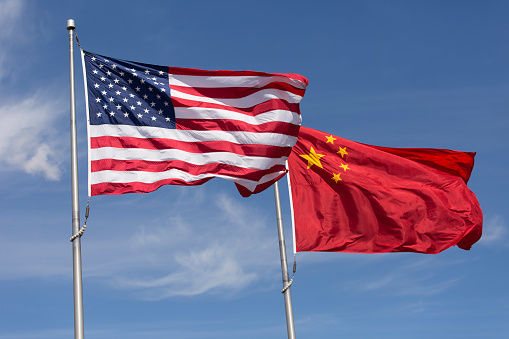Hours after the AUKUS was announced, Chinese embassy in Washington reacted to the Indo-Pacific security pact between the United States, Australia and the United Kingdom. In a statement, the Beijing representative said that the three countries ‘should shake off their Cold-War mentality and ideological prejudice’.
US President Joe Biden alongside British Prime Minister Boris Johnson and Australian Prime Minister Scott Morrison, who joined him by video, unveiled the AUKUS. The alliance will allow for greater sharing of defense capabilities — including helping equip Australia with nuclear-powered submarines.
Also read: AUKUS faces international backlash; New Zealand bans Australian nuclear submarines
The three announced they would quickly turn their attention to developing nuclear-powered submarines for Australia.
Beijing was not directly mentioned in the remarks but this alliance is formed as China’s influence in the Indo-Pacific grows. The Asian giant has at several instances lashed out at Biden as he’s sought to refocus US foreign policy on the Pacific in the early going of his presidency.
When asked to comment by Reuters, Chinese embassy spokesman Liu Pengyu said countries “should not build exclusionary blocs targeting or harming the interests of third parties. In particular, they should shake off their Cold-War mentality and ideological prejudice.”
Also read: Biden to meet Walt Disney, Microsoft CEOs; vaccine mandate on agenda
The US-China relationship seems to have deteriorated over the last decade. Beijing has taken exception to Biden administration officials repeatedly calling out China over human rights abuses in Xianjing province, the crackdown on democracy activists in Hong Kong, and cybersecurity breaches originating from China, as well as Beijing’s handling of the coronavirus pandemic and what the White House has labeled as “coercive and unfair” trade practices.
Even as White House officials have repeatedly spoken out about China, administration officials say they want to work with Beijing on areas of common interest, including curbing the pandemic and climate change.
Also read: Justice for J6: What to expect from the Washington DC rally
Biden spoke by phone with China’s President Xi Jinping last week amid growing frustration on the American side that high-level engagement between the two leaders’ top advisers has been largely unfruitful.
After the 90-minute phone call, official Xinhua News Agency reported that Xi expressed concerns that U.S. government policy toward China has caused “serious difficulties” in relations.
With inputs from the Associated Press






